|
De Duitse dichteres en schrijfster Marie Luise Kaschnitz werd geboren op 31 januari 1901 in Karlsruhe. Zie ook alle tags voor Marie Luise Kaschnitz op dit blog.
Der Leuchtturm
Wer weiß, ob diese Alten auf der Insel
Wirklich die richtigen waren, das Kind zu erziehen.
Ein Trinker, eine Schlampe. Sie gaben es her unter Tränen.
Da kam es aufs Festland, weit fort, hinter Zäune und Mauern
Zu anderen Kindern. Die nahmen es auf die hörner,
Das junge Freiwild. Höhnten sein Gebrechen,
Das Heimweh hieß, verschrieen seine Träume.
Wer weiß, ob aus diesen Kindern überkurz überlang
Nicht Freunde geworden wären. Aber nicht jeder
Nimmt sich zusammen, hält den Atem an.
Nicht jeder übersteht seine finsteren Weihen.
Der Knabe, unserer, hielt den Atem nicht an.
Er trank die Feindschaft der Welt, eine bittere Salzflut,
erbrach sie und floh. Schlief einmal draußen im Stadtwald
Unter klirrenden Zapfen, wurde zurückgebracht.
Kam ein zweites Mal weiter, erreichte die Straße meerwärts.
Fiel dort auf, weil er lief mit eingezogenen Fäusten
Und wehenden Haaren, wurde zurückgebracht.
Beim drittten Mal fand ihn kein lebendes Wesen mehr.
Nur der Finger des Leuchtturms, der strich über Düne und Hafen,
Ertastete zwei aufgerissene Augen,
So lange, bis das feste Knabenfleisch
Geschmolzen war. Da liegt es unser Heimweh,
Von Vögeln ausgeweidet. Ein Skelett
Im schwarzen Hafer. Flugsand deckt es zu.
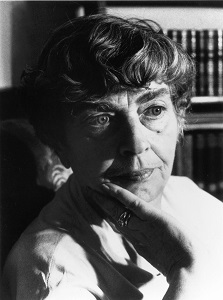
Marie Luise Kaschnitz (31 januari 1901 – 10 oktober 1974)
De Japanse schrijver Kenzaburo Oe werd op 31 januari 1935 geboren in het dorp Oso op het eiland Shikoku. Zie ook alle tags voor Kenzaburo Oe op dit blog.
Uit:A Personal Matter (Vertaald door John Nathan)
“One day Bird had approached his father with this question; he was six years old: Father, where was I a hundred years before I was born? Where will I be a hundred years after I die? Father, what will happen to me when I die? Without a word, his young father had punched him in the mouth, broke two of his teeth and bloodied his face, and Bird forgot the fear of death.”
(…)
„You’re right about this being limited to me, it’s entirely a personal matter. But with some personal experiences that lead you way into a cave all by yourself, you must eventually come to a side tunnel or something opens on a truth that concerns not just yourself but everyone. And with that kind of experience at least the individual is rewarded for his suffering. Like Tom Sawyer! He had to suffer in a pitch-black cave, but at the same time he found his way out into the light he also found a bag of gold! But what I’m experiencing personally now is like digging a vertical mine shaft in isolation; it goes straight down to a hopeless depth and never opens on anybody else’s world. So I can sweat and suffer in that same dark cave and my personal experience won’t result in so much as a fragment of significance for anybody else. Hole-digging is all I’m doing, futile, shameful hole-digging; my Tom Sawyer is at the bottom of a desperately deep mine shaft and I wouldn’t be surprised if he went mad!”
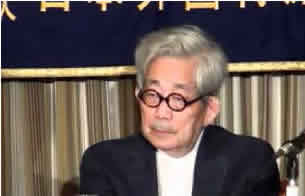
Kenzaburo Oe (Oso, 31 januari 1935)
De Zwitserse dichter en schrijver Kurt Marti werd geboren op 31 januari 1921 in Bern. Zie ook alle tags voor Kurt Marti op dit blog.
de heer onze god
de heer onze god
heeft het helemaal niet behaagd dat gustav e. lips
in een verkeersongeval omkwam
ten eerste was hij te jong
ten tweede voor zijn vrouw een tedere man
ten derde voor twee kinderen een vrolijke vader
ten vierde voor vrienden een goeie vriend
ten vijfde vele ideeën rijk
hoe moet het nu zonder hem?
wat is zijn vrouw zonder hem?
wie speelt met de kinderen?
wie vervangt een vriend?
wie heeft de nieuwe ideeën?
het heeft de heer onze god
helemaal niet behaagd
dat enkelen van jullie dachten
zoiets heeft hem behaagd
in de naam van wie doden opwekte i
n de naam van de dode die opstond:
wij protesteren tegen de dood van gustav e.lips
Vertaald door Piet Thomas
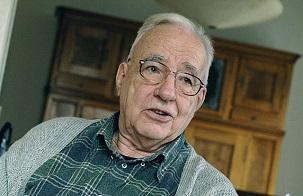
Kurt Marti (Bern, 31 januari 1921)
De Amerikaanse schrijver John 'O Hara werd geboren op 31 januari 1905 in Pottsville, Pennsylvania. Zie ook alle tags voor John 'O Hara op dit blog
Uit:Appointment in Samarra
“Anyone in Gibbsville who had any important money made it in coal; anthracite. Gibbsville people, when they went away, always had trouble explaining where they lived. They would say: “I lived in the coal regions,” and people would so, “
Oh, yes, near Pittsburgh.” Then Gibbsvillians would have to go into detail. People outside of Pennsylvania do not know that there is all the difference in the world between the two kinds of coal, and in conditions under which anthracite and bituminous are mined. The anthracite region lies roughly between Scranton on the north and Gibbsville on the south. In fact Point Mountain, upon which Gibbsville’s earliest settlement was made, is the delight of geologists who come from as far away as Germany to examine Gibbsville Conglomerate, a stone formation found nowhere else in the world. When that geological squeeze, or whatever it was that produced veins of coal, occurred, it did not go south of Point Mountain, and coal is found on the north slope of Point Mountain, but not on the sought side, and at the eastern face of Point Mountain is found Gibbsville Conglomerate. The richest veins of anthracite in the world are within a thirty-mile sector from Gibbsville, and when those veins are being worked, Gibbsville prospers. When the mines are idle, Gibbsville puts on a long face and begins to think in terms of soup kitchens.
The anthracite region, unlike the bituminous, is a stronghold of union labor. The United Mine Workers of America is the strongest single force in the anthracite region, and under it the anthracite miner lives a civilized life compared with that of the miner in the soft coals regions about Pittsburgh, West Virginia, and the western states.”

John 'O Hara (31 januari 1905 - 11 april 1970)
De Amerikaanse schrijver Zane Grey werd geboren op 31 januari 1872 in Zanesville, Ohio. Zie ook alle tags voor Zane Grey op dit blog.
Uit: Riders of the Purple Sage
“While she waited there she forgot the prospect of untoward change. The bray of a lazy burro broke the afternoon quiet, and it was comfortingly suggestive of the drowsy farmyard, and the open corrals, and the green alfalfa fields. Her clear sight intensified the purple sage-slope as it rolled before her. Low swells of prairie-like ground sloped up to the west. Dark, lonely cedar-trees, few and far between, stood out strikingly, and at long distances ruins of red rocks. Farther on, up the gradual slope, rose a broken wall, a huge monument, looming dark purple and stretching its solitary, mystic way, a wavering line that faded in the north. Here to the westward was the light and color and beauty. Northward the slope descended to a dim line of cañons from which rose an up-flinging of the earth, not mountainous, but a vast heave of purple uplands, with ribbed and fan-shaped walls, castle-crowned cliffs, and gray escarpments. Over it all crept the lengthening, waning afternoon shadows.
The rapid beat of hoofs recalled Jane Withersteen to the question at hand. A group of riders cantered up the lane, dismounted, and threw their bridles. They were seven in number, and Tull, the leader, a tall, dark man, was an elder2 of Jane's church.
"Did you get my message?" he asked, curtly.
"Yes," replied Jane.
"I sent word I'd give that rider Venters half an hour to come down to the village. He didn't come."
"He knows nothing of it," said Jane. "I didn't tell him. I've been waiting here for you."
"Where is Venters?"
"I left him in the courtyard."
"Here, Jerry," called Tull, turning to his men, "take the gang and fetch Venters out here if you have to rope him."
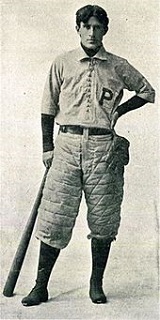
Zane Grey (31 januari 1872 – 23 oktober 1939)
Als student in 1895
De Nederlandse schrijver, dichter en dominee Anthony Winkler Prins werd geboren te Voorst op 31 januari 1817. Zie ook alle tags voor Anthony Winkler Prins op dit blog.
Bui
Grimmig snellen rondgerolde wolken,
Eindeloos grote kluwens, aan door 't blauw.
Doodse stilte! Toch, ze naadren gauw,
Scherp weerspiegeld in de molenkolken.
Schelle fonkling van miljoenen dolken;
Dan de donder; en, van regen lauw,
Schudt de wind de hechte molenbouw,
Loeit het rund, dat wegvlucht, ongemolken.
Zuiver, als geslepen edelstenen
In een rand van donker goud gevat,
Spiedt de klaproos door de halmen henen,
Glanst de koornbloem helder na het bad;
En het paard, met glimmend stijve benen,
Scheert de klaver, koel en druipend nat.
Gedachte
De bloem, door gure najaarsvlagen
Verschrompeld en verdord en van de steel geslagen,
Verrukt het oog niet meer;
Maar als de lente naakt, de winterboei verbrekend,
En langs het grazig veld de schoonste kleuren tekent
Dan rijst zij schoner weer.
Zo wisselt alles hier beneden:
’t Verachtelijk slijk, waarin wij vaak met huivring treden,
Is dikwijls ras een bloem, die pracht van kleuren biedt;
En vaak hecht zich de bloem, wier luister wij begroeten,
Wier geur het hart verrukte, als slijk aan onze voeten,
En wij bemerken ’t niet!
Maar wat in ’t voorjaar rijz’, verjeugdigd en herboren,
Het kan de doodse rust van ’t akelig graf niet storen,
Waar ’t statig gewormt zich nestelt in het slijk:
’t Is dor en levenloos, als de uitgedroogde splinter;
Ja, drie voet onder de aard is ’t zomer, herfst en winter
En lente te gelijk!
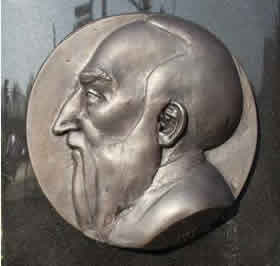
Anthony Winkler Prins (31 januari 1817 – 4 januari 1908)
Monument in Voorburg (detail)
De Vlaamse dichteres en schrijfster Maria Elisa Belpaire werd geboren te Antwerpen op 31 januari 1853. Zie ook alle tags voor Maria Elisa Belpaire op dit blog.
Uit: Engeltjes
'T was avond en het lof scheidde uit, toen ik in den tempel trad. Reeds begon de duisternis, als een floers, de statige zuilen om te zweven; een nageblevene wierookgeur vervulde de beuken; de keerskens werden een na een uitgedoofd en 't laatste akkoord stierf onder de hooge gewelven. Geheim schuilde in iederen hoek van den tempel; stilte en duisternis vervulde het wijde kerkschip.
‘Wat moet de tempel schoon zijn bij nachte!’ dacht ik in mijn eigen, en plotseling schoot mij deze gril te binnen. ‘Dat ik mij hier liet opsluiten!’
Zoo gedacht, zoo gedaan. Ik kroop achter eenen biechtstoel, en wanneer de sleutel in de poort ophield met krassen, sloop ik uit mijne schuilplaats. - Ik was alleen in den tempel.
Met poppelend hart, zag ik in den ronde om; mijne eigene stappen deden mij beven en op de teenen ging ik naar het hooge koor.
Dikwijls in den dag, had ik het autaar bewonderd, dat zijne luchtige bogen in de hoogte verheft. Op alle kanten en hoeken, in alle nissen, staan engeltjes verscholen, gelijk vogelen in hooge takken. Sommige zijn grooter, andere weer kleiner, maar alle hebben de lange vlerken geplooid, gereed om ze uit te breiden en heen te vliegen op 't eerste teeken. Voor het gesloten tabernakel brandde met rooden gloed, het lichtje dat de tegenwoordigheid van 't Allerheiligste aanduidt. Ik zat in het gestoelte neer, omringd door de vriendelijke houten beeldekens, die ik zoo dikwijls onder het gebed had aanschouwd. Hier de gansche geschiedenis der Moeder-Maagd; daar eene rei hoekige, uitgemergelde monniken; verder de Pater noster, in zeven beeldekens uitgelegd, waarvan het schoonste, Stephanus, met uitgestrekte handen, de vraag verbeeldt: - ‘En vergeef ons onze schulden, gelijk wij vergeven onze schuldenaren.’ - Rond deze hoofdtooneelen, wemelt het van bloemen, bladeren, dieren, zwaluwen in hun nest, heiligen-figuurkens van allerfijnste teekening en zuiverste schoonheid. ‘Thans,’ dacht ik, ‘zal ik die allen eens gerust mogen bezien, gerust in hun midden mogen droomen!’
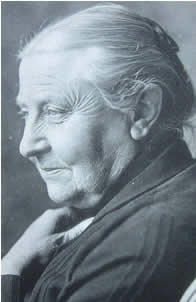
Maria Elisa Belpaire (31 januari 1853 – 9 juni 1948)
De Amerikaanse schrijver (van Franse afkomst) Michel-Guillaume Jean de Crèvecoeur werd geboren op 31 januari 1735 in Caen. Zie ook alle tags voor Jean de Crèvecœur op dit blog.
Uit: Letters from an American Farmer
“Where is it that these English folks won't go? One who hath seen the factory of brimstone at Suvius, and town of Pompey under ground! wouldst thou pretend to letter it with a person who hath been to Paris, to the Alps, to Petersburg, and who hath seen so many fine things up and down the old countries; who hath come over the great sea unto us, and hath journeyed from our New Hampshire in the East to our Charles Town in the South; who hath visited all our great cities, knows most of our famous lawyers and cunning folks; who hath conversed with very many king's men, governors, and counsellors, and yet pitches upon thee for his correspondent, as thee calls it? surely he means to jeer thee! I am sure he does, he cannot be in a real fair earnest. James, thee must read this letter over again, paragraph by paragraph, and warily observe whether thee can'st perceive some words of jesting; something that hath more than one meaning: and now I think on it, husband, I wish thee wouldst let me see his letter; though I am but a woman, as thee mayest say, yet I understand the purport of words in good measure, for when I was a girl, father sent us to the very best master in the precinct. She then read it herself very attentively: our minister was present, we listened to, and weighed every syllable: we all unanimously concluded that you must have been in a sober earnest intention, as my wife calls it; and your request appeared to be candid and sincere. Then again, on recollecting the difference between your sphere of life and mine, a new fit of astonishment seized us all!"
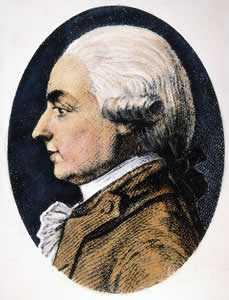
Jean de Crèvecœur ( 31 januari 1735 – 2 november 1813)
31-01-2015 om 15:26
geschreven door Romenu 
Tags:Marie Luise Kaschnitz, Kenzaburo Oe, Kurt Marti, John 'O Hara, Zane Gray, Anthony Winkler Prins, Maria Elisa Belpaire, Jean de Crèvecoeur, Romenu
|

